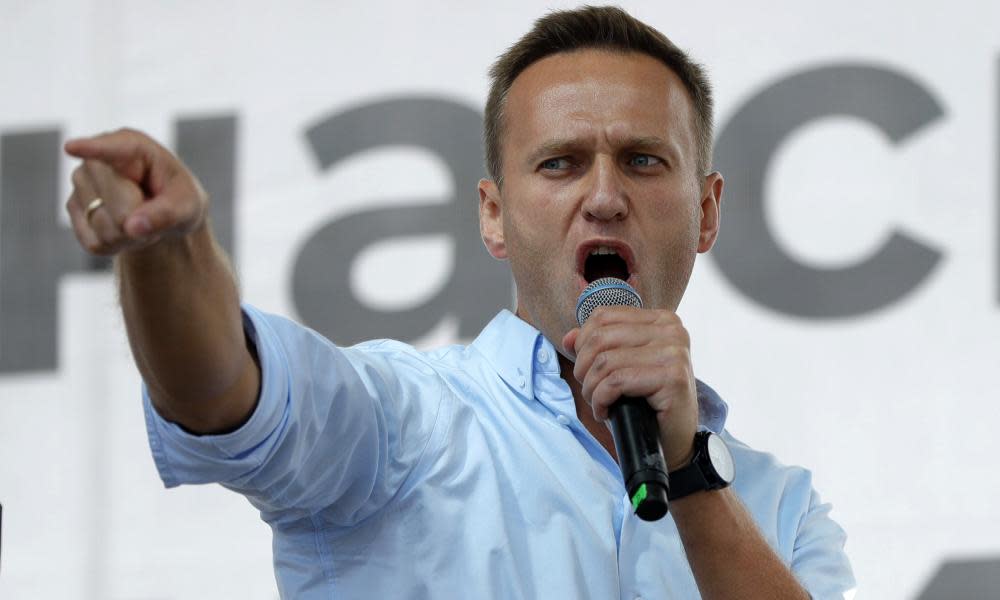Alexei Navalny arrives in Germany for treatment for suspected poisoning

Russian opposition activist Alexei Navalny has been evacuated to a hospital in Berlin to be treated for suspected poisoning, after his wife and supporters begged Vladimir Putin to let him leave a Siberian hospital.
Doctors in the city of Omsk had initially refused to allow him to leave their care, but he was finally allowed to fly out on an air ambulance sent by a German charity in the early hours of Saturday morning.
After landing in Berlin, Navalny, 44, was rushed in a convoy of ambulance and police cars to Berlin’s Charité hospital complex.
The hospital said in a statement it would provide an update about his condition and further treatment once tests had been completed and after consulting with his family, adding this could take some time.
Before Navalny left Siberia, doctors had said he was in an induced coma, and his life was not in immediate danger. But Navalny’s spokeswoman, Kira Yarmysh, said after the plane departed that the “struggle for Alexei’s life and health is just beginning”.
Самолёт с Алексеем вылетел в Берлин.
Огромное спасибо всем за поддержку. Борьба за жизнь и здоровье Алексея только начинается, и предстоит пройти еще очень много, но сейчас хотя бы сделан первый шаг— Кира Ярмыш (@Kira_Yarmysh) August 22, 2020
Doctors treating Navalny permitted his discharge on Friday night, after a 12-hour standoff with his family and aides, who said his life was in danger in Russia.
Related: Alexei Navalny: a muckraking irritant to powerful Russians
Yarmysh said hospital officials had suddenly reversed their position on Friday evening. “It is a pity that it took so long for the doctors to make this decision,” she said. “The plane has been waiting since this morning, the documents were also ready then.”
Navalny, a fierce critic of Putin, has been in hospital in a coma and on a ventilator after he suddenly fell ill on a flight on Thursday. His supporters had said they believed the hospital was under pressure to delay his transfer to thwart a proper investigation into what caused his sudden illness, which forced pilots to make an emergency landing as he screamed in agony.
The head doctor at Omsk’s emergency hospital No 1, Alexander Murakhovsky, said Navalny had not been poisoned but had been diagnosed with a metabolic disease caused by low blood sugar. He said that may have caused the opposition figure’s collapse onboard the flight to Moscow on Thursday, although it would not explain why he had not regained consciousness more than a day later.
“They have an order: don’t let him go so that it will be impossible for an independent laboratory to confirm poison,” wrote the Navalny ally Leonid Volkov.
Murakhovsky had said Navalny was too sick to be moved, despite saying just hours earlier that his condition had improved. “Anything could happen. Even the worst could happen,” he said.
Ivan Zhdanov, the director of Navalny’s Anti-Corruption Foundation, said a police official had told him they had found a “deadly substance”, but refused to divulge what it was, citing the investigation.
“This substance presents a risk to the life of not just Alexei, but those around him too,” the police official had said, according to Zhdanov. “Everyone around him should be wearing protective equipment.”
Murakhovsky said traces of chemical substances had been found on Navalny’s clothes and fingers but not his blood, and said they were “normal, industrial chemicals used in plastic cups, for instance”.
Related: West holding back on criticism of Russia over Navalny 'poisoning'
If confirmed as a poisoning, it would be the latest in a series of high-profile attacks, often with poison, against opposition figures and Russian dissidents that includes the 2018 poisoning of Sergei Skripal and the 2015 shooting death of the opposition politician Boris Nemtsov.
The incident has attracted global attention. The White House national security adviser, Robert O’Brien, said the news was “extraordinarily concerning” and could affect US-Russia relations.
The German chancellor, Angela Merkel, joined the French president, Emmanuel Macron, in expressing concern over Navalny’s condition and said he could receive treatment in Germany or France. “I hope that he can recover and naturally whether it be in France or in Germany he can receive from us all the help and medical support needed,” Merkel said in a joint news conference with Macron.
The US whistleblower Edward Snowden, who is currently in Russia, wrote of the suspected poisoning: “If confirmed, it is a crime against the whole of Russia. There can be no democracy without dissent.”

 Yahoo News
Yahoo News 
